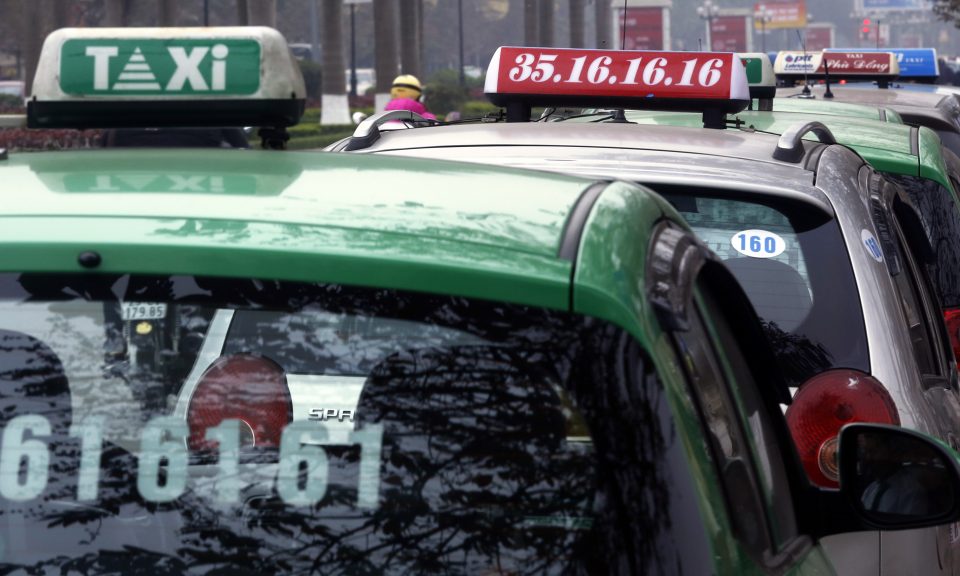By MA NGUYEN
Vietnam is making the leap from ride-hailing to ride-sharing now that Uber Technologies Inc’s top regional rival has rolled out GrabShare for carpool services in Ho Chi Minh City.
Grab made the announcement on Tuesday in Vietnam’s commercial hub, saying the company’s research showed people would be willing to give up their cars if every hailed ride arrives within three minutes of calling.
Grab bills itself as Vietnam’s first commercial carpool service, though a couple of young Vietnamese already launched a company known as PinBike for so-called motorbike pooling.
“The benefits return to you, each and every one of you, because you spend less time in traffic jams,” Jeremy Lim, head of Grab Vietnam, said in a dramatic press conference announcing the new service.
To underscore his promised ride-share revolution, Lim emerged from a bright green Grab car inside the conference hall. After he alighted, a singer crooned a ditty about making new carpool friends, while attendees snapped selfies behind a cardboard cutout of a bright green Grab vehicle.
Grab will charge customers in Ho Chi Minh City 30% less if they carpool instead of hailing rides individually. The company said incomes for drivers in the region have risen on average 15% in countries that already have GrabShare, namely Indonesia, Malaysia, the Philippines, Singapore and Thailand.
(Grab and Uber face a crackdown in Thailand on charges their drivers aren’t properly registered or insured.)
Uber and Grab both boast their services reduce traffic by removing idle taxis looking for customers from the road. But Vietnamese are already asking questions whether the ride-hailing apps worsen traffic congestion by attracting more drivers seeking higher wages.
One news report quoted a police chief saying car registrations spiked 30% year-on-year in Ho Chi Minh City during the first three quarters of 2016. The official said many of those new cars are now being used as ride-hailing taxis. With Uber and Grab offering competitive discounts, people who used to travel by motorbike can now afford to hail a four-wheel ride.
Traffic is a “headache,” said National Traffic Safety Committee deputy chair Khuat Viet Hung, who was invited to speak at Grab’s press conference. He said he hopes the Singapore-based company can help authorities ease the gridlock, as well as better manage public transit and tourist travel.
“Grab works closely with the government and with the local government,” Hung said. Since entering Vietnam in 2014, Grab representatives have met with public officials regularly to discuss how to regulate and tax the country’s emerging new sharing economy.
Land of the iconic motorbike, Vietnam is fighting clogged streets by building metro train systems and pedestrian-only promenades to encourage walking. At the same time, Vietnam expects a flood of new cars when the Association of Southeast Asian Nations removes vehicle tariffs among its ten members in 2018. That will allow more locals to buy cars, sales of which already jumped 32% year on year in 2016.
While the transportation sector is in transition, Uber and Grab have been locked in a fierce head-to-head contest, as well as wider competition from traditional taxi competitors like Mai Linh and Vinasun, to be king of Vietnam’s roads. By one estimate, taxis have lost 10% of their previous annual revenues since the introduction of tech-driven foreign challengers.
With a population of 92 million and a fast-growing economy, Vietnam is one of the few places where Uber configured its app for motorbikes as well as cars.
Grab has followed suit, with its motorbike-driving contractors scooting around town with bright green branded helmets, jackets, ponchos and masks. The company has also tried to push customers into putting funds into GrabPay accounts, an e-wallet system to pay not only for rides but also goods from third-party businesses.
As in other regional markets, Grab and Uber have faced opposition in Vietnam from those who allege they pay lower taxes and are less regulated than traditional taxi companies. There have also been reports of contract drivers scamming or endangering passengers. In August, an Uber driver in Ho Chi Minh City reportedly drove a customer into an empty alley and swiped her phone and funds.
The adoption of carpooling poses an additional security element, critics say, especially in a country that doesn’t have a tradition of hitch-hiking or carpooling as in the United States. Nguyen Thi Thuy Phuong, Grab’s Vietnam director of information and markets, has tried to assuage those concerns through a 24-hour hotline to field customer complaints about other customers.
Grab’s carpool option will pilot in Ho Chi Minh City, with a beta test to follow in the capital of Hanoi. “It’s going to be a virtuous cycle,” Lim said with the requisite idealism of a technology start-up pursuing a new market. “The more we use GrabShare, the better it is for society in general.”
